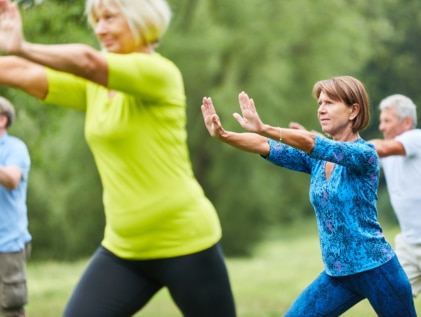Tai chi combines slow movements, deep breathing, and meditation and is meant to stimulate the flow of “chi,” or vital energy, throughout the body. The ancient tradition, which originated in China as a martial art and is often referred to as “meditation in motion,” has become a popular form of exercise among older adults in the Western world. Tai chi is easily accessible to all types of people because it doesn’t require any equipment and can be done anywhere. Even more appealing to seniors is that tai chi is incredibly low-impact, making it easy on the muscles, tendons, and joints.
In addition to promoting feelings of serenity and inner peace, tai chi has myriad mental and physical benefits:
Fall Prevention. Falls account for the highest number of accident-related deaths in the senior population. Tai chi requires participants to continually shift their weight from one foot to the other, which has been shown to improve balance and provide a better awareness of one’s body in space. With better balance comes less risk for falling as well as heightened confidence to navigate uneven surfaces and unfamiliar terrain.
Muscular Strength. Though it is not a strenuous form of exercise, tai chi may have significant impacts on the muscular strength and endurance of the upper body, lower body, and the core. It has been shown to have similar effects on muscle strength as brisk walking or engaging in a resistance training program. Improving muscle strength and endurance is key to being able to perform activities of daily living, such as climbing stairs and carrying groceries.
Flexibility and Joint Health. Flexibility and joint health become compromised as we age. The movements in tai chi provide lubrication to joints, which reduces swelling or pain and improves symptoms of arthritis. Furthermore, tai chi can increase range of motion and flexibility and help with maintaining proper posture.
Improved Sleep. A 2016 study found that practicing tai chi twice per week improved sleep in adults with cognitive impairment. This is excellent news considering that sleep deprivation has been identified as a risk factor for Alzheimer’s in addition to diabetes, depression, and heart disease.
Stress Relief. Tai chi requires a sense of calm and mind-body connection that encourages being present in the moment, similar to practicing mindfulness. The meditation, movement, and focused breathing of tai chi have been shown to increase feelings calmness and reduce stress and anxiety.

